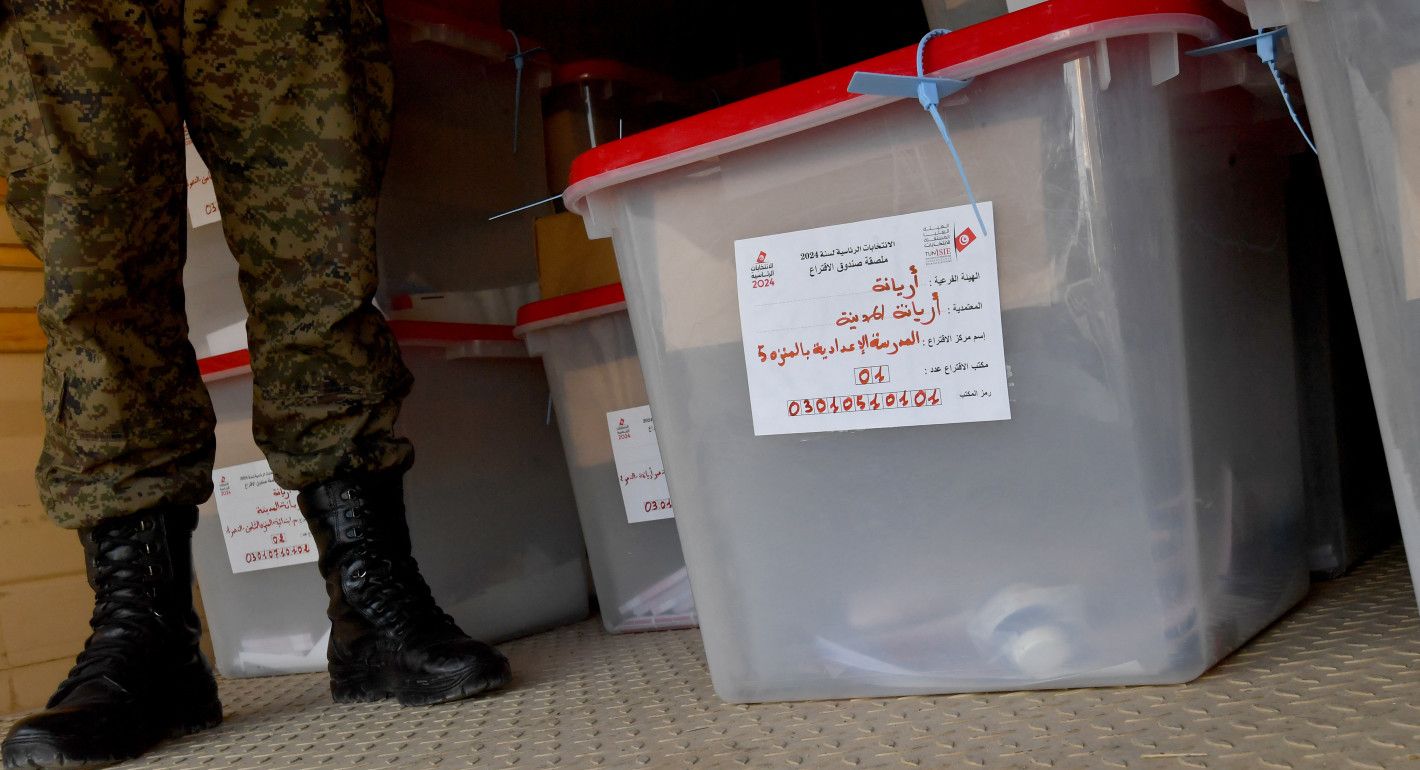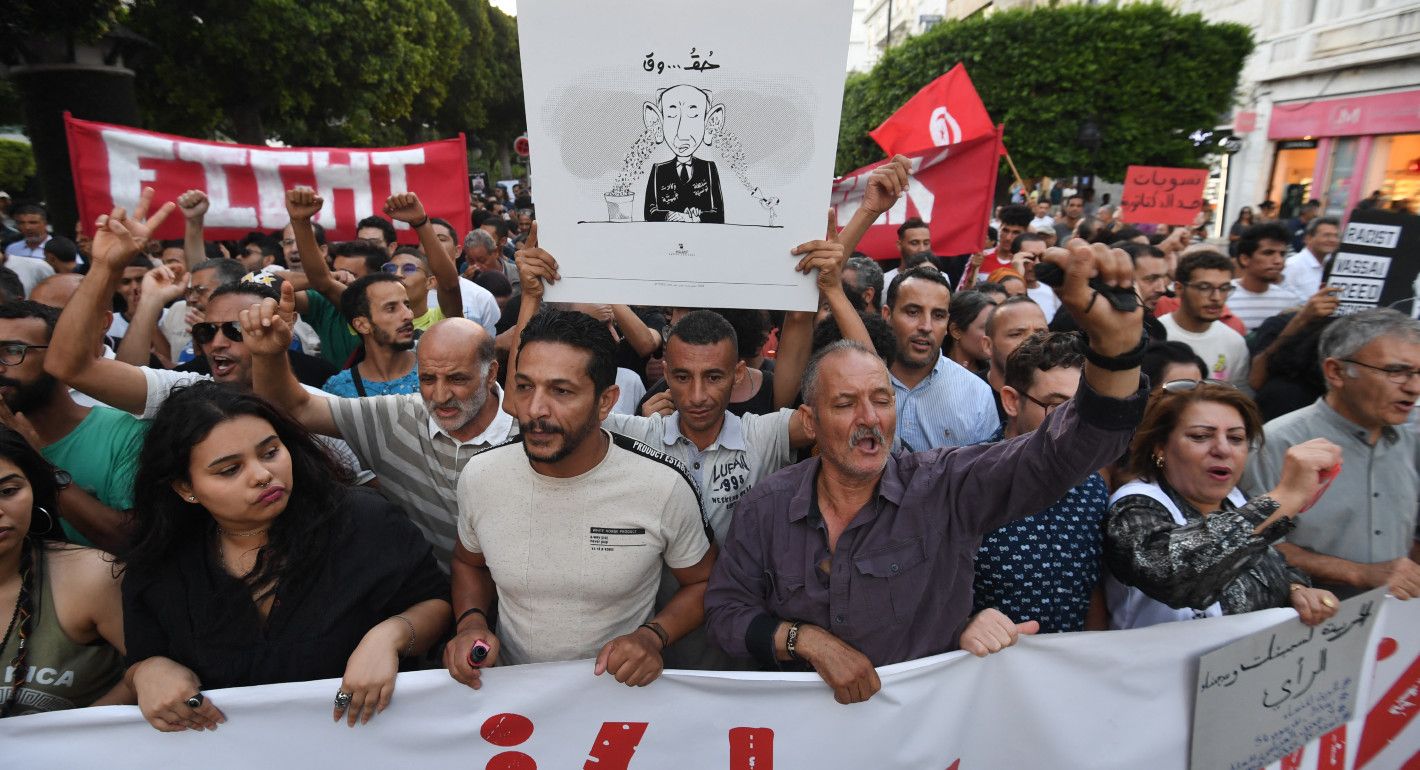On a recent episode of The World Unpacked, host Sophia Besch spoke with Carnegie senior fellow Sarah Yerkes about Tunisia’s recent elections. An excerpt from their conversation, which has been edited for clarity, is below.
Sophia Besch: Kais Saied has been reelected with over 90 percent of the vote in a landslide victory with very low turnout. Leading up to this election, we saw weeks of protest and a lot of controversy surrounding how the electoral process was handled. Tunisians rallied in the demonstration against Saied, claiming that the election would not be legitimate. Can you tell us more about these claims?
Sarah Yerkes: This election was very meaningful for a variety of reasons, but mostly because it was such a departure from the 2019 elections, which were when Saied himself came to power. What we saw over time was that he has chipped away at the decade of democratic progress, really within a very short period.
Saied has very adeptly used the law and his credibility from being a constitutional law professor to change the rules of the game. To say it was unequal is not even close to how much he manipulated the system. In the end there were three candidates on the ballot: Saied himself; another person who had been a Saied loyalist for quite a long time, but who did start to be a little critical of him in the end; and a third candidate who represented the opposition but who was in jail because of the same laws that Saied created. Saied went so far in manipulating [the election]—not even trying to pretend it was democratic in any way, shape, or form.
Sophia Besch: You were in Tunisia for the last presidential elections as an election observer, so this must have felt very different this time around.
Sarah Yerkes: Absolutely. It was remarkable in 2019 to be on the ground for the first round, just not knowing who was going to win. I was in, just by chance, some of the Saied strongholds. And even then, we didn’t know he would win—there were twenty-nine candidates. To see people going to vote, not knowing the outcome, with people representing every possible interest—versus this time around where you have this incumbent who cleared the field for himself and made it so that anyone who wanted to challenge him is terrified of being thrown in jail. It’s night and day.
Sophia Besch: Where there even electoral observers this time around?
Sarah Yerkes: There were some. When I was there, I was part of a U.S. delegation that regularly observes these sorts of contests. There was an EU mission, an African Union mission, and local Tunisian NGOs on the ground.
This time the situation was very different. Western countries either chose not to go, because they knew the vote would not be free and fair, or were not invited. You did have Russian observers, as well as an African Union mission. But I think what’s actually more important is you didn’t have the Tunisian civil society groups you had last time. There were a couple of really prominent civil society organizations that were present in 2019 and in previous contests that applied to go, and they were prohibited because they received foreign funding. They, like any other civil society organization, get funding from abroad. But the fact that they were prohibited from going shows you how afraid Saied was to let anyone with any credibility pay attention to what was happening on the ground.
Sophia Besch: The United States has invested significantly in the training and in the development of Tunisia’s military. Would you say that this is still a trusted institution today? How do you see the military’s role evolving under Saied’s continued role?
Sarah Yerkes: The military is a very important and interesting actor right now. It’s been able to maintain its status as the most trusted institution in the country, in part because it is very intentionally apolitical.
Back in 2017, there were local elections for the first time. When [lawmakers] created the local elections law, they decided to let the military vote. The military had been prohibited from participating in elections. I forget the exact number, but somewhere around 90 percent of the military didn’t actually vote. When [servicemembers] were interviewed, they said that they didn’t think it was their place to participate in politics. That shows you to the extreme how apolitical they view themselves, and that has carried over.
Saied has tried to politicize the military, but for the most part, the military is trying to stay out of this. Contrast that with the police, the internal security services, who are very much politicized and are very much the ones who are carrying out Saied’s wishes.
If we were to see large-scale repression, if the military were to be called to fire on protesters, my instinct is they would say no, that there would be a red line there, that they would not. And part of this is due to U.S. training.
The United States, Germany, and others have done a really important and very effective job at training the Tunisian military both on how to operate in a democracy and working on security-sector reform. There are things that it could certainly do better, but it has not only improved its ability to maintain its status as apolitical, but has also really done a good job at countering terrorism. Tunisia had faced a lot of threats that it frankly doesn’t face right now because of the military’s role.
There’s a debate [in U.S. government] of what to do with the Tunisian military. There are voices in Congress that say, “Let’s cut off all aid to Tunisia, period.” But others—and I’m in this camp—say that that’s a bad idea. Maintaining those ties with the military officers is important not only for Tunisian security—and by extension for European security, for American security—but also just to have someone to tell them, “Don’t fire on protesters.”
Sophia Besch: How do we see Russia and China showing up in this region? What does that mean for the ties that Tunisia has to foreign partners?
Sarah Yerkes: Saied himself has been very actively courting Russia since he came to power. He’s clearly tried to make this shift away from the Western partners toward other potential partners, whether it’s for funding or diplomatic support. Right after the beginning of the war between Russia and Ukraine, Saied scheduled a state visit to Moscow, and someone luckily got in his ear and told him that was not a good idea, and he ended up not doing it. But he has been very much trying to get on Russia’s good side. [Russian President Vladimir] Putin is distracted, understandably, with many other things, so he doesn't pay much attention to Tunisia. But I think if Saied had his way, he would like to see a stronger Russian relationship.
During Tunisia’s democratic transition, China was quite active in growing its presence, largely in the tourism sector. Tunisia has a large tourism economy. China has a lot of tourists. There were some different agreements made between China and Tunisia. The democratic government really courted China as well to help with the economic picture. And that wasn’t seen as much of a threat to U.S. and European interests at the time.
Some of the other things that they’ve done—Huawei is everywhere in Tunisia, they’ve built a large undersea cable between Tunisia and Italy—[indicate that] China has largely filled a gap that the United States and Europe were not filling when it comes to different economic interests.
That being said, there is concern—China is very interested in Tunisia’s ports. Tunisia is a peninsula in the Mediterranean with a lot of coastline—very strategic, very close to Europe. There is fear over spying and what that could mean long term if China gets more involved. China has not, though, stepped up to fill in this massive hole in Tunisia’s budget, which they would love for China to do. They really, really need foreign assistance. The United States and Europe have stepped back tremendously and China has not been willing to jump in. So I think Tunisia matters to China in a sense, but it’s not its priority even in North Africa.
Sophia Besch: Is there is still a pathway back to a democratic Tunisia?
Sarah Yerkes: Democratic transitions take a really long time. I tend to be optimistic that we will someday look back on this potentially as a blip in Tunisia’s democratic trajectory.
The people who brought about the revolution almost fifteen years ago were really impressive actors. These are people who risked their lives—and some of them lost their lives—to unseat a dictator who had been in power for much, much longer than Saied. Those people are still there. Some of them have had to flee in exile, some of them are in jail, but a lot of them are still fighting. And I think that shows you that there is an appetite for democracy.
All this training, all this funding that the United States and Europe did with civil society actors, with parliament, with the media—that training did go somewhere. [Tunisia] is not a complete vacuum. So I think it is worth continuing to help with development and climate change, which is a major issue impacting Tunisia right now. Trying to maintain those relationships that the United States has built up for a long time is important, particularly because a lot of the civil society actors have no one else to support them.
I don’t think we should expect any positive democratic change under Saied. If he sticks to his own constitution, he’ll be out in five years—he’s term-limited to two terms. I’m not going to put my money on him actually abiding by that, but there will potentially be a chance.
So one of the recommendations for policymakers is to start working today with young Tunisians who really care about democracy. You help them form new political parties, help them become an alternative, so if there is an open field in five years, you will have the ability to potentially have someone new take over.
I’ve been doing a lot of research on countries around the world in their early democratic transitions—what works, what doesn’t, what’s the role of external actors. It’s given me a lot of hope, because a lot of the times, once you’ve experienced and tasted democracy, you’re better off the second time around. Sometimes it takes a third or fourth try. I don’t think people are going to give up on it that quickly, but we’ll see. I try to end on an optimistic note, although I hope it doesn’t come back to bite me later on.
To listen to the full episode, use the player below or your favorite podcast app.
Or watch it on YouTube.
Emissary
The latest from Carnegie scholars on the world’s most pressing challenges, delivered to your inbox.







